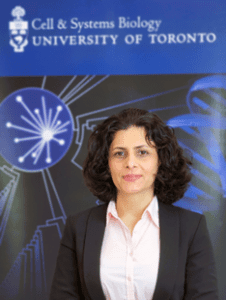
- This event has passed.
Canadian Neuroscience Seminars – Post-Doc series Azam Asgarihafshejani & Samantha Carew
DATE: Thursday, November 2, 2023
TIME: 3pm ET/12pm PT
ZOOM LINK: https://utoronto.zoom.us/j/85845251397
SPEAKER: Azam Asgarihafshejani, University of Toronto
TITLE: Neurogliaform cell synaptic transmission and GABAergic signaling alteration in the hippocampal circuit of animal model of Rett syndrome
 Dr. Azam Asgarihafshejani is a researcher in the Department of Cell and Systems Biology, working under Dr. Melanie Woodin’s supervision. Her research focuses on synaptic transmission and plasticity in hippocampal slices, employing electrophysiological methods to investigate mechanisms that regulate inhibition. Specifically, she explores excitation/inhibition balances in neurodevelopmental disorders, centering her attention on CA1 pyramidal neurons, neurogliaform (NGF) interneurons, the Schaffer collateral and temporo-ammonic pathways.
Dr. Azam Asgarihafshejani is a researcher in the Department of Cell and Systems Biology, working under Dr. Melanie Woodin’s supervision. Her research focuses on synaptic transmission and plasticity in hippocampal slices, employing electrophysiological methods to investigate mechanisms that regulate inhibition. Specifically, she explores excitation/inhibition balances in neurodevelopmental disorders, centering her attention on CA1 pyramidal neurons, neurogliaform (NGF) interneurons, the Schaffer collateral and temporo-ammonic pathways.
During her presentations, she discusses the absence of long-term potentiation (LTP) in the CA1 region of the hippocampus in male and female Rett syndrome mouse models. Her findings highlight dysregulated NGF interneurons as a potential underlying mechanism for impaired LTP.
Prior to her current role, she held two postdoctoral positions—one at the University of Victoria with Dr. Kerry Delaney, and the other at the Université de Montreal, Department of Neuroscience, with Dr. Jean-Claude Lacaille. She characterized optogenetically induced LTP in SOM-INs, demonstrating its dependence on mGluR1a and mTORC1 signaling. Additionally, her work revealed that optogenetic activation of CA1 pyramidal inputs is sufficient to induce LTP of SOM-IN afferent synapses.
SPEAKER: Samantha Carew, Memorial University of Newfoundland
TITLE: Inflammation-induced impairments in LTP are rescued by L-type calcium channel antagonism
 Following successful completion of her Bachelor’s degree at Memorial University of Newfoundland and Labrador, Samantha earned a PhD in higher order fear memory with Dr. Qi Yuan at Memorial. Here, she built unique olfactory learning paradigms like pheromone- and second-order conditioning, combining behavioural and molecular techniques to probe neural ensembles underlying memory.
Following successful completion of her Bachelor’s degree at Memorial University of Newfoundland and Labrador, Samantha earned a PhD in higher order fear memory with Dr. Qi Yuan at Memorial. Here, she built unique olfactory learning paradigms like pheromone- and second-order conditioning, combining behavioural and molecular techniques to probe neural ensembles underlying memory.
Samantha is a mother to two young children and decided to stay at Memorial to pursue a postdoctoral fellowship during the pandemic. Working with Dr. Matthew Parsons and Dr. Craig Moore enabled her to apply electrophysiological techniques to the field of neuroimmunology. Her postdoctoral work focuses on the impact of inflammation on synaptic plasticity, particularly how the expression of a voltage-gated calcium channel (Cav1.2) in neurons and astrocytes changes in response to inflammatory stimuli, and subsequent effects on long-term potentiation.
Samantha was drawn to neuroscience research early in her studies, as several of her family members were lost to Alzheimer’s disease. Her expertise in learning and memory combined with neuroimmunology and electrophysiology provide her with a unique perspective to investigate neurodegenerative disease.
